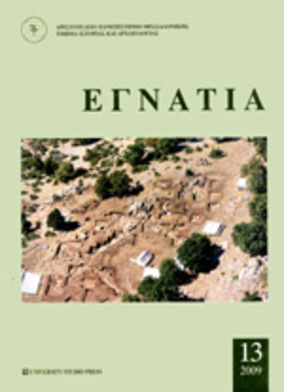Η μητρόπολη Θεσσαλονίκης και οι σχέσεις με την κεντρική πολιτική και εκκλησιαστική εξουσία τον 13ο αιώνα : η περίπτωση του μητροπολίτη Μανουήλ Δισύπατου
Part of : Εγνατία ; No.14, 2010, pages 29-41
Issue:
Pages:
29-41
Parallel Title:
The archbishopic of Thessaloniki and the relations with the central political and ecclesiastical authorities in the 13th c. : the case of metropolitan Manuel Disypatos
Section Title:
Ιστορία
Author:
Abstract:
The purpose of this paper is to present the attitude of the archbishop of Thessaloniki Manuel Disypatos (t.a.q. 1256/1258-1260) towards important political-dynastic and ecclesiastical issues: on one hand, towards the issue of Michael Palaiologos’ coronation and the supersession of the legitimate heir of the byzantine throne and, on the other hand, towards the deposition of Patriarch Arsenios, which was to cause the ecclesiastical-political dissent known as the Arseniatic schism.Manuel Disypatos remained firmly loyal to the royal family of the Lascarids; he and the archbishop of Sardeis Andronicos were the only bishops who supported the efforts of Patriarch Arsenios to safeguard and protect the lawful rights of the adolescent successor Ioannis IV Laskaris against the plan of Michael Palaiologos to usurp the imperial crown. Manuel Disypatos did not hesitate to abandon his own see, in order to demonstrate his strong diss- aproval of the deposition of the dissident patriarch. As a result, he was also deposed and exiled as an opponent of the newly ordained patriarch Nicephoros and the newly crowned emperor Michael Palaiologos. The hypothesis that Disypatos was reinstated, when Arsenios repossessed the patriarchal see is now rejected on the basis of two pieces of evidence which had been disregarded. Thus, there is no doubt that his successor Ioannikios Kydonis, who was a loyal supporter of Palaiologos, managed to maintain his prelatic duties continually until 1272, and perhaps until 1283. The emperor would not allow a self-opinionated and combative prelate to hold the important archbishopric of Thessaloniki, especially when he intended to launch a unionist policy between the churches of Rome and Constantinople. In deed in the Synodicon of the Thessaloniki and in other sources Disypatos is called «the confessor», no doubt because of his strong objection to the union of the churches in Lyon (1274).
Subject:
Subject (LC):
Notes:
Το θέμα ανακοινώθηκε στο ΚΑ 'Διεθνές Επιστημονικόν Σνμπόσιον «Χριστιανική Θεσσαλονίκη». Χριστιανική Θεσσαλονίκη και Κωνσταντινούπολις από του ενδεκάτου αιώνος μέχρι σήμερον, Ιερά Μονή Βλατάδων 18-20 Οκτωβρίου 2007. Θα ήθελε να ευχαριστήσει θερμά και από τη θέση αυτή τη σεβαστή καθηγήτρια κ. Αλκμήνη Σταυρίδου-Ζαφράκα για τον χρόνο που αφειδώς αφιέρωσε, για να μελετήσει το κείμενό της, και για τις καίριες επισημάνσεις και τις πολύτιμες συμβουλές της. Επίσης, ευχαριστεί τη διδάκτορα αγγλικής φιλολογίας Α.Π.Θ. κ. Αναστασία Ζαφράκα, που έλεγξε την αγγλική περίληψη του άρθρου.




